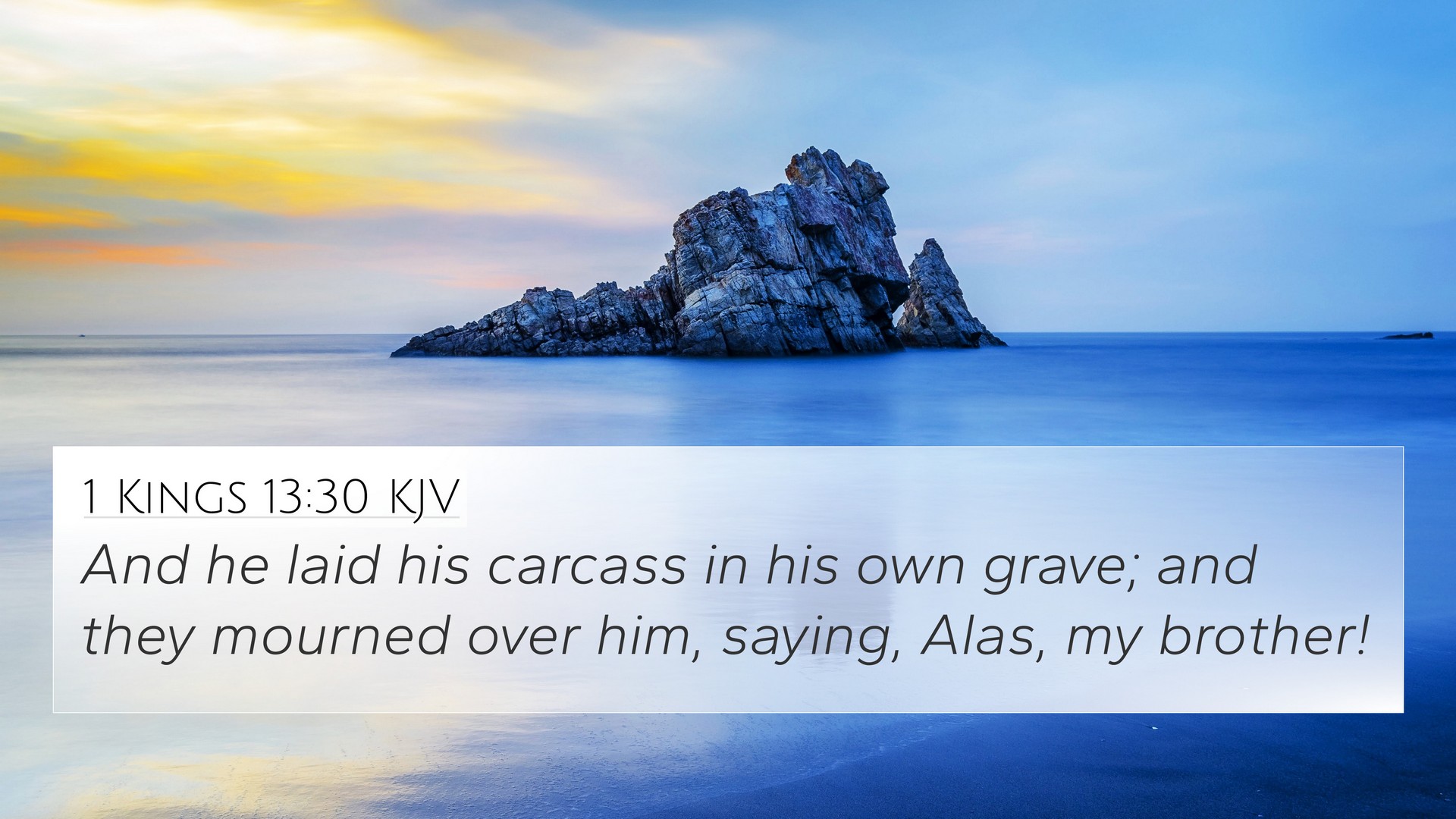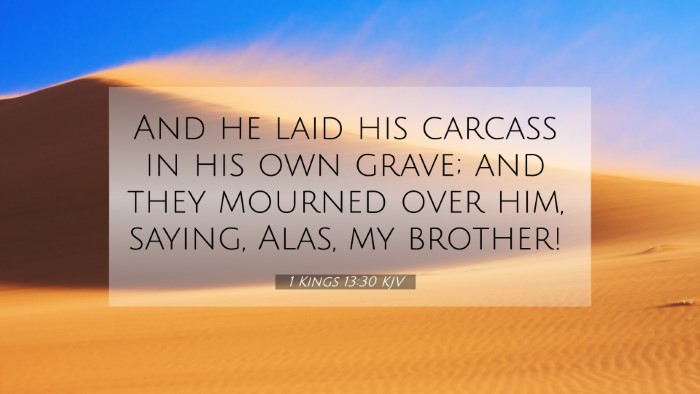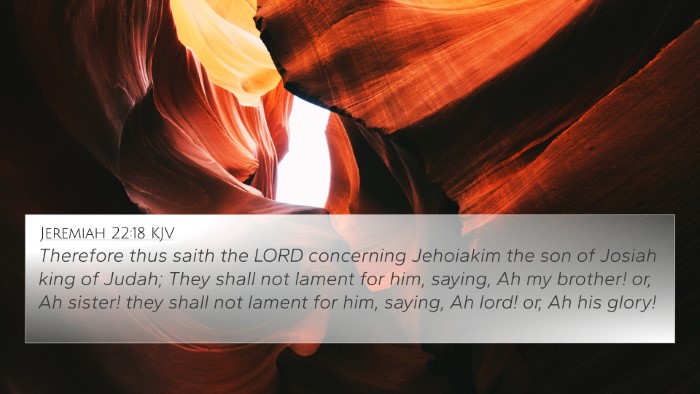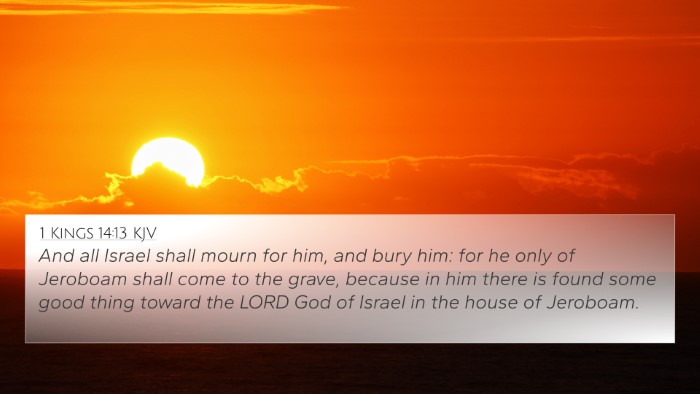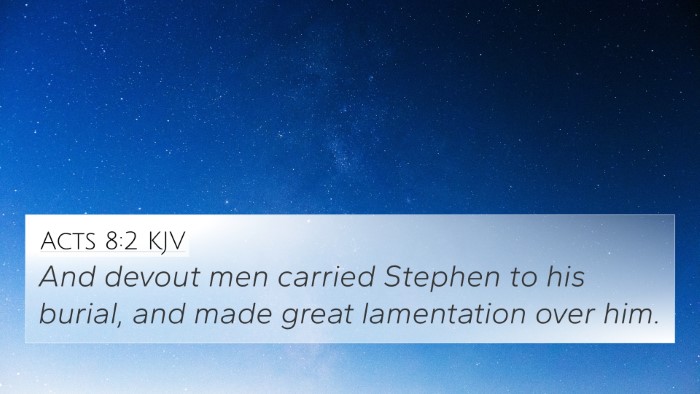Understanding 1 Kings 13:30
The verse 1 Kings 13:30 states: "And he laid his carcass in his own grave; and they mourned over him, saying, Alas, my brother!" This passage narrates the death of a prophet who had disobeyed God's command and subsequently faced dire consequences. The insights from various public domain commentaries provide a deeper understanding of this important scripture and its implications within the overarching narrative of the Bible.
Commentary Insights
Matthew Henry: In his exposition, Henry emphasizes the tragic end of the disobedient prophet. He reflects on the theme of consequences for turning away from God’s instructions. This serves as a cautionary tale about the seriousness of God’s commands and the importance of adherence to divine will.
Albert Barnes: Barnes highlights the themes of mourning and remorse in the aftermath of the prophet's death. He discusses how the grave is a symbol of both physical death and a spiritual warning to those who stray from God. The funeral expresses the sorrow of the collective, illustrating the impact of one individual's failures on the community.
Adam Clarke: Clarke provides insights into the cultural practices surrounding death in ancient Israel. He notes the significance of mourning rituals and their role in community bonding. Clarke also examines the narrative's implications for prophetic authority and the consequences of false prophesy, reinforcing the need for alignment with God's will.
Thematic Connections
The themes found in 1 Kings 13:30 resonate throughout the Bible, establishing connections between various texts that highlight obedience, sin, and community consequences. The following list illustrates some pertinent cross-references:
- 1 Samuel 15:23 - "For rebellion is as the sin of witchcraft..." – This verse reflects on the seriousness of disobedience to God, paralleling the fate of the prophet.
- Jeremiah 23:16 - "Do not listen to the words of the prophets..." – A warning about listening to false prophets aligns with the disobedience depicted in 1 Kings 13:30.
- Matthew 7:15 - "Beware of false prophets..." – Jesus' admonition echoes the same theme of recognizing true messages from God, relevant to the events surrounding 1 Kings 13.
- Proverbs 14:12 - "There is a way that seems right to a man, but its end is the way of death." – This proverb connects with the downfall resulting from the prophet's misleading path.
- Hebrews 10:31 - "It is a fearful thing to fall into the hands of the living God." – A reminder of the weight of divine judgment, relevant to the consequences faced by the prophet.
- Isaiah 30:10 - "Who say to the seers, 'Do not see,'..." – Connections here can be drawn to the rejection of genuine prophetic voices, resonating with the events in Kings.
- Luke 9:62 - "No one who puts a hand to the plow and looks back is fit for service..." – A related concept of commitment in serving God is intertwined with obedience.
Lessons on Obedience and Repentance
The narrative of 1 Kings 13:30 serves as a pivotal study on the attributes of obedience to God and the importance of repentance. The fate of the prophet can be viewed through various lenses:
- Obedience to Divine Command: The core message is that straying from God's commands can lead to irrevocable consequences.
- The Nature of Prophecy: The authority of prophets and the dangers of false prophecies are of significant importance.
- Community Impact: The collective mourning signals how one individual's disobedience can resonate throughout the community, emphasizing communal responsibility.
- Hope for Repentance: Although the story is tragic, it can inspire reflection on human fallibility and the importance of returning to God.
Cross-Referencing Biblical Texts
Understanding 1 Kings 13:30 enriches one’s study of the Bible through cross-referencing. It invites readers to explore connections between the Old and New Testaments, which reveal the consistency of God’s message throughout scripture.
For those seeking to delve deeper into cross-referencing biblical texts, the following resources and tools can enhance one’s study:
- Bible Concordance for finding related terms and themes.
- Bible Cross-reference Guide for navigating connections between verses.
- Comprehensive Bible cross-reference materials to explore parallel themes extensively.
- Cross-reference Bible study methods to facilitate structured learning.
- Identifying connections between Old and New Testament texts for thematic exploration.
Conclusion
The analysis of 1 Kings 13:30 underscores the critical nature of obedience in the life of believers. It serves as a somber reminder of the potential repercussions of turning away from God's path, while also encouraging believers to engage in consistent scriptural study to draw connections between various biblical teachings. The lessons unearthed through comparative biblical verse analysis can lead to tremendous growth in faith and understanding of God’s will.
